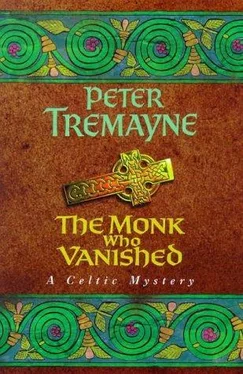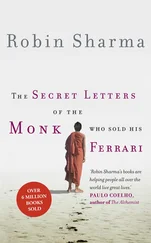Peter Tremayne - The Monk Who Vanished
Здесь есть возможность читать онлайн «Peter Tremayne - The Monk Who Vanished» весь текст электронной книги совершенно бесплатно (целиком полную версию без сокращений). В некоторых случаях можно слушать аудио, скачать через торрент в формате fb2 и присутствует краткое содержание. Жанр: Исторический детектив, на английском языке. Описание произведения, (предисловие) а так же отзывы посетителей доступны на портале библиотеки ЛибКат.
- Название:The Monk Who Vanished
- Автор:
- Жанр:
- Год:неизвестен
- ISBN:нет данных
- Рейтинг книги:3 / 5. Голосов: 1
-
Избранное:Добавить в избранное
- Отзывы:
-
Ваша оценка:
- 60
- 1
- 2
- 3
- 4
- 5
The Monk Who Vanished: краткое содержание, описание и аннотация
Предлагаем к чтению аннотацию, описание, краткое содержание или предисловие (зависит от того, что написал сам автор книги «The Monk Who Vanished»). Если вы не нашли необходимую информацию о книге — напишите в комментариях, мы постараемся отыскать её.
The Monk Who Vanished — читать онлайн бесплатно полную книгу (весь текст) целиком
Ниже представлен текст книги, разбитый по страницам. Система сохранения места последней прочитанной страницы, позволяет с удобством читать онлайн бесплатно книгу «The Monk Who Vanished», без необходимости каждый раз заново искать на чём Вы остановились. Поставьте закладку, и сможете в любой момент перейти на страницу, на которой закончили чтение.
Интервал:
Закладка:
‘You mean that you suspected the bó-aire of lying?’
‘Not really,’ Fidelma replied. ‘But it is wise to be as precise as possible and double-check all the facts. Let us go in and speak with this Cred who seems so disapproved of in this community.’
Fidelma started forward but Eadulf held her back a moment, pointing up at the tavern sign. It was a muscular smith, swinging his hammer on an anvil.
‘Isn’t that a coincidence?’ he asked.
‘Not really,’ smiled Fidelma. ‘Creidne Cred was the divine artificer of the ancient gods of Ireland who worked in bronze, brass and gold. He was the one who made hilts for swords, rivets for spears and bosses and rims for shields during the war between the pagan gods and their enemies.’
‘Then one more thing, before we pass in. I heard both the abbot and the bó-aire say that this place was not licensed. What does that mean?’
‘It would appear to be a tavern which also brews its own ales but it is not a lawful one, what we call dligtech. ’
‘Then surely the bó-aire, as the local law officer, can close it down?’
Fidelma shook her head with a smile. ‘It does not mean that this tavern is contrary to law but merely that the law takes no cognisance of it. What this means is, if a question of dispute arises, the person going into an unlawful tavern must be made aware of it for he has no legal grounds for taking action.’
‘I am not sure that I understand,’ replied Eadulf.
‘A lawful tavern keeper must pass three strict tests regarding the quality of the drink he serves. If he serves bad ale he can be challenged under law. In an unlawful house, if a person complains about the quality of the ale, then he cannot demand recompense under the law. Now, enough, let’s find this Cred.’
She passed into the tavern. The room seemed deserted except for two men in a corner drinking ale. They were roughly dressed, bearded men, who had the appearance of labourers. They glanced at Fidelma and Eadulf indifferently and carried on with their drinking and their soft-toned conversation.
There was a movement behind a curtained doorway which causedthem to turn and the curtain swung back to reveal a woman of ample proportions. She had obviously seen better days. She came forward eagerly but her face fell when she saw the nature of their apparel.
‘The abbey has better accommodation for the religious,’ she began uncompromisingly. ‘You will find this place a little too crude for the likes of the well bred and pious people.’
One of the two men chuckled wheezily in appreciation at what he considered was the woman’s wit.
‘We do not seek accommodation,’ Eadulf replied immediately and with a stern voice. ‘We seek some information.’
The woman sniffed and folded her flabby arms across her generous bosom. ‘Why seek information here?’
‘Because we believe that you can supply it,’ replied Eadulf uncompromisingly.
‘Information comes expensive, especially to a foreign cleric,’ the woman replied, hearing Eadulf’s accent. Her eyes examined him speculatively as if wondering how much he carried with him.
‘Then you will provide the information to me,’ Fidelma said quietly.
The woman’s eyes narrowed as they swung round on her.
Fidelma and Eadulf were aware that the two men had stopped their muttered conversation over their drinks and had turned to examine them without disguising the curiosity on their faces.
‘Perhaps I do not want to provide any information, even if I have it.’ The woman was implacable.
‘Perhaps,’ smiled Fidelma gently. ‘But withholding evidence from a dálaigh can be a serious matter.’
The woman’s eyes narrowed further. The corners of her mouth turned down. There was a tension in the room and the two men returned to their drinks but from their attitudes they remained acutely aware of the conversation of their hostess.
‘Where is the dálaigh who demands evidence of me?’ sneered the buxom woman.
‘I am here,’ Fidelma announced softly. ‘And I presume that you are Cred, the owner of this unlicensed inn?’
The woman let her arms drop to her side. Various expressions chased one another across her face as if she couldn’t make up her mind whether Fidelma was in earnest or not.
The woman flushed in annoyance. ‘I am the tavern keeper, Cred. I keep a good, respectable inn, licensed or not.’
‘That is a matter between you and your bó-aire. I need information. About a week ago there was a man passing through this township. He had the appearance of a professional archer and could not be mistakenfor anything else. He rode a chestnut mare with a loose shoe and so had business at the smith’s forge.’
Fidelma was aware that the two men had not resumed their conversation and were listening intently to what she was saying. Out of the corner of her eye, she saw a third man enter the room from the back of the inn. She did not turn to examine him closely because she was too intent on gazing directly into the face of the hostess of the inn so that she could gauge her reactions. Yet she was aware that the third man had halted and was staring across the room towards them.
The woman, Cred, still stared defiantly back at Fidelma. ‘How do I know that you are a dálaigh ?’ she countered. ‘I do not have to answer questions from any slip of a girl — religieuse or not.’
Fidelma reached under her habit and took out a cross on a golden chain. Its symbolism was well known throughout Muman. The Order of the Golden Chain was a venerable Muman nobiliary fraternity that had sprung from membership of the ancient elite warrior guards of the Kings of Cashel. The honour was in the personal presentation of the Eóghanacht kings. Fidelma’s brother had bestowed the honour on her because of her services to the kingdom. Cred’s eyes bulged a little as she recognised it.
‘Who are you?’ she asked, but in gentler, more complaisant tones.
‘I am …’ she began.
‘Fidelma of Cashel!’ The words came from the third man in a hushed breath.
The fat woman’s jaw sagged.
Fidelma allowed herself to glance at the man. He was dressed as the other two men, in rough working clothes. His weatherbeaten features spoke of an outdoor life. He jerked his head in a curious obeisance towards her.
‘I am from Cashel, too, lady. I work for …’
Fidelma’s thoughts had moved rapidly. ‘For Samradan the merchant? You three men are his drivers?’
The man was nodding eagerly. ‘That is so, lady.’ He turned to the hostess and added quickly: ‘Fidelma of Cashel is not only a dálaigh but sister of the King.’
Cred reluctantly bowed her head. ‘Forgive me, lady. I thought …’
‘You thought that you would help me by answering my questions,’ Fidelma cut in sharply, with a dismissive nod towards the man who had identified her. He moved to join his companions in their hurried, whispered conversation, casting surreptitious glances in her direction.
‘I … yes … Yes. The Saigteóir, we called him. He stayed two orthree nights a week ago. A tall man with fair hair. He spoke with a terse accent and invited no questions. He carried a long bow and no other weapon.’
The woman’s words came out in a rush.
‘I see. Did you gather anything else about him?’
Cred shook her head almost violently. ‘As I say, he was a man not given to talk,’ she said. ‘His words were chosen with care and no more than would convey his wants which were as few as his words.’
‘He had business at the smith’s?’
‘Even as you said. His horse had a loose shoe and I think he bought arrows from the smith as well, for when he arrived he had few arrows in his quiver but when he left here his quiver was full.’
Читать дальшеИнтервал:
Закладка:
Похожие книги на «The Monk Who Vanished»
Представляем Вашему вниманию похожие книги на «The Monk Who Vanished» списком для выбора. Мы отобрали схожую по названию и смыслу литературу в надежде предоставить читателям больше вариантов отыскать новые, интересные, ещё непрочитанные произведения.
Обсуждение, отзывы о книге «The Monk Who Vanished» и просто собственные мнения читателей. Оставьте ваши комментарии, напишите, что Вы думаете о произведении, его смысле или главных героях. Укажите что конкретно понравилось, а что нет, и почему Вы так считаете.












